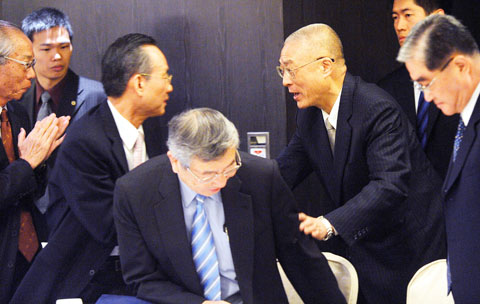Premier Wu Den-yih (吳敦義) yesterday denied speculation that Taiwan would allow Chinese banks to merge with or invest in Taiwanese banks or financial institutions.
Asked to comment on reports that Chinese banks would now be allowed to merge with Taiwan-based banks and financial institutions, Wu told the Taiwan Foreign Correspondents Club that this was not the case.
“So far, it is not the case that Chinese banks can buy Taiwanese banks,” Wu said.

PHOTO: CHIEN JUNG-FONG, TAIPEI TIMES
He said, however, that during talks on a proposed economic cooperation framework agreement (ECFA) between Taiwan and China, discussions could touch on allowing one or two Chinese banks to open branches in Taiwan.
“We might discuss one or two Chinese branches being able to establish themselves in Taiwan,” the premier said, “but there will be no discussions on acquiring Taiwanese banks.”
Wu, who emphasized that the administration would take a “step-by-step” approach to cross-strait agreements, said that an ECFA would not be discussed during the fourth round of talks between the Straits Exchange Foundation and China’s Association for Relations Across the Taiwan Strait in Taichung later this month.
Negotiations on an ECFA, he said, would start at the beginning of next year.
Minister of Economic Affairs Shih Yen-shiang (施顏祥) said later yesterday that the two sides would begin formal negotiations on an ECFA after the Lunar New Year, which falls in mid-February.
Earlier yesterday, Wu told representatives of the Chinese National Association of Industry and Commerce (CNAIC, 工商協進會) that Taiwan’s industrial development would be jeopardized without an ECFA in view of the threats posed by ASEAN Plus One.
With the ASEAN Plus One to take effect next year, the average export tariffs on Taiwanese goods to China will be 9 percent more than those of ASEAN countries — a disadvantage that could put companies off setting up production facilities in Taiwan, he said.
Taiwan will be further marginalized when a free-trade zone is formed among ASEAN with China, South Korea and Japan, he said.
CNAIC chairman Theodore Huang (黃茂雄) said that the government should allay companies’ skepticism on the potential impact of an ECFA and come up with plans to help affected industries.

Sweeping policy changes under US Secretary of Health and Human Services Robert F. Kennedy Jr are having a chilling effect on vaccine makers as anti-vaccine rhetoric has turned into concrete changes in inoculation schedules and recommendations, investors and executives said. The administration of US President Donald Trump has in the past year upended vaccine recommendations, with the country last month ending its longstanding guidance that all children receive inoculations against flu, hepatitis A and other diseases. The unprecedented changes have led to diminished vaccine usage, hurt the investment case for some biotechs, and created a drag that would likely dent revenues and

Global semiconductor stocks advanced yesterday, as comments by Nvidia Corp chief executive officer Jensen Huang (黃仁勳) at Davos, Switzerland, helped reinforce investor enthusiasm for artificial intelligence (AI). Samsung Electronics Co gained as much as 5 percent to an all-time high, helping drive South Korea’s benchmark KOSPI above 5,000 for the first time. That came after the Philadelphia Semiconductor Index rose more than 3 percent to a fresh record on Wednesday, with a boost from Nvidia. The gains came amid broad risk-on trade after US President Donald Trump withdrew his threat of tariffs on some European nations over backing for Greenland. Huang further

CULPRITS: Factors that affected the slip included falling global crude oil prices, wait-and-see consumer attitudes due to US tariffs and a different Lunar New Year holiday schedule Taiwan’s retail sales ended a nine-year growth streak last year, slipping 0.2 percent from a year earlier as uncertainty over US tariff policies affected demand for durable goods, data released on Friday by the Ministry of Economic Affairs showed. Last year’s retail sales totaled NT$4.84 trillion (US$153.27 billion), down about NT$9.5 billion, or 0.2 percent, from 2024. Despite the decline, the figure was still the second-highest annual sales total on record. Ministry statistics department deputy head Chen Yu-fang (陳玉芳) said sales of cars, motorcycles and related products, which accounted for 17.4 percent of total retail rales last year, fell NT$68.1 billion, or

HSBC Bank Taiwan Ltd (匯豐台灣商銀) and the Taiwan High Prosecutors Office recently signed a memorandum of understanding (MOU) to enhance cooperation on the suspicious transaction analysis mechanism. This landmark agreement makes HSBC the first foreign bank in Taiwan to establish such a partnership with the High Prosecutors Office, underscoring its commitment to active anti-fraud initiatives, financial inclusion, and the “Treating Customers Fairly” principle. Through this deep public-private collaboration, both parties aim to co-create a secure financial ecosystem via early warning detection and precise fraud prevention technologies. At the signing ceremony, HSBC Taiwan CEO and head of banking Adam Chen (陳志堅)